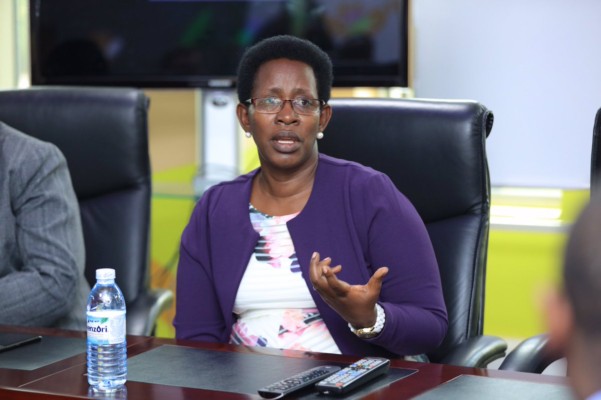UGANDA COVID-19 VACCINE: The Ministry of Health has come out to assure Ugandans that the received Astra-Zeneca vaccine is safe for use amidst public outcry on the authenticity and non-approval of the vaccine by the World Health Organization (WHO).
In a series of tweets, the health ministry’s permanent secretary, Dr Diana Atwine, took time to respond to public concerns about the vaccine saying even those who have been cured of COVID-19 need the vaccine because of variants that keep changing.
“Those previously infected have some level of protection, covering between 6-8 months and the vaccine would act as a booster to give one longer-term protection”, she explained.
“Like any vaccine, those who get vaccinated may experience some mild symptoms after taking the jab. For this reason, they will be monitored for 30 minutes after the jab” Atwiine added.
Last week, the WHO country representative, Dr Tegegn Woldemariam, said the vaccine was safe, although there was no sufficient data yet on its long-term effects.
Expectant mothers, who are at risk of infection, are advised to take the vaccine, Woldemariam explained, insisting that the vaccines have minimal side-effects. Several countries have reported deaths associated with the vaccines.
On Wednesday, South Korean launched a probe into the death of two citizens shortly after receiving the AstraZeneca vaccine. However, both persons had preexisting conditions and developed symptoms within days of taking the vaccines, authorities disclosed.
Uganda is one of the several beneficiaries of the free Covid-19 vaccines, after Ghana, Ivory Coast, Kenya, Rwanda and Nigeria, which have already received their initial supplies. Ahead of the vaccine roll-out, the health ministry has categories of people selected to receive the vaccine for their own protection against severe illness resulting from infection.
Under the first phase, about 150,000 frontline health workers, nearly 250,000 security personnel and about 550,000 teachers will receive the inoculations. Also considered are about 3,348,500 people aged 50 years and above, along with about half a million people below the age of 50, but with underlying health conditions.
Ugandans eligible for vaccination will be required to present their national identification cards to get the vaccine, while non-Ugandans will be required to present their passports. Those without national IDs are required to present their National Identification Numbers (NIN), which will be verified by the National Identification Authority (NIRA) staff at vaccination points.
UK backs COVAX initiative The UK said it was firmly behind the COVAX initiative to deliver vaccines to poor countries, including Uganda, having committed £548m to the global effect.
The British High Commissioner, Kate Airey, said in a statement yesterday that in Uganda, the UK has donated test kits and supplied personal protective equipment, provided training and helped deliver messages on COVID-19 prevention.
It has also helped children continue learning through the provision of distance learning lessons, provided media training to counter misinformation and ensure accurate COVID-19 reporting.
It also funded two COVID-19 isolation rooms for children suffering from cancer in Kampala. “I am proud that the UK is one of the biggest donors to COVAX, securing over one billion doses for the most vulnerable people in countries around the world, including Uganda.
I am delighted that the first vaccines will arrive in Uganda today. The UK is supporting COVAX because we want to be a force for good in the world and because we need a global solution to a global pandemic.
Next week, thanks to UK Aid and other donors’ support, people in Uganda will start to be vaccinated; I hope this will be a major step forward to ending the pandemic,” she stated. The scheme aims at distributing enough doses to vaccinate up to 27% of the population in the 92 poorest participating economies by the end of the year.
The African Union Commission will host a meeting on April 12 to develop a roadmap for the continent to start manufacturing Covid-19 vaccines. At least 198 countries and territories are participating in COVAX, though not all of them are in the first wave of distribution.
Over 238 million doses will be distributed around the world by the end of May under the COVAX programme aimed at boosting access to vaccines in poorer nations.
A call for equity
On Thursday, civil society organisations in Uganda asked the Government to put in place strict measures to avoid diversion of vaccines to people who are not meant to be vaccinated.
The executive director of the Centre for Health Human Rights and Development, Moses Mulumba, said the vaccination programme should be guided by the principle of equity. Dr Fred Ssebisubi, the commissioner for pharmacy at the health ministry, said medics will use other measures to also vaccinate those without IDs nor the NIN. For instance, he said, elderly persons who may not have their national IDs can be easily identified by their village colleagues.
Ssebisubi, however, encouraged Ugandans who do not have IDs to try and collect them since they will aid the ministry’s planning process.
If you would like your article/opinion to be published on Uganda’s most authoritative news platform, send your submission on: [email protected]. You can also follow DailyExpress on WhatsApp and on Twitter (X) for realtime updates.



